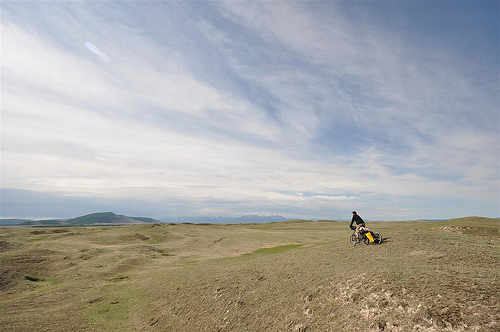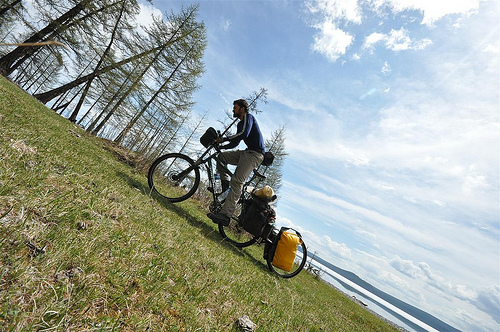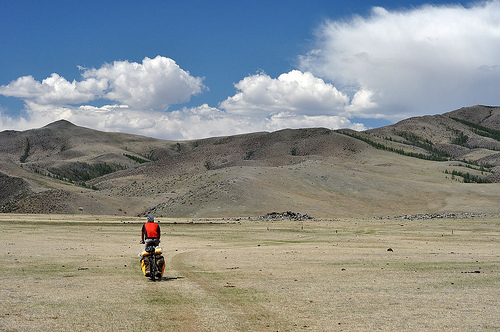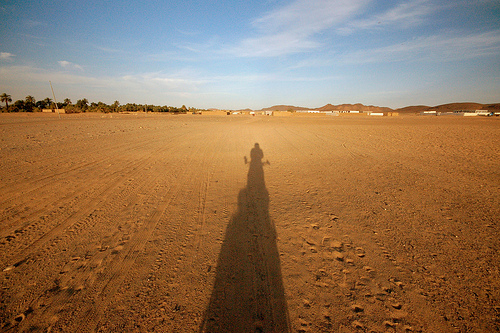THIS ARTICLE: Is written by Tom Allen who has recently returned to the UK with his mountain bike having spent the last few years travelling on it through 30-odd countries. His old teammate Andy Welch recently gave us some tips for anyone planning a big cycling expedition and now it’s Tom’s turn to give some pointers to anyone thinking about doing such a trip off-road.

[divide]
10 Tips for Your First Off-Road Bicycle Expedition
by Tom Allen
1. Choose The Right Tool For The Job
Off-road biking comes with an entirely different set of requirements to road touring. Take a leaf out of the mountain-biking book and design your steed from the ground up as a robust trail-devouring machine.
Fat, puncture-proof expedition tyres together with hand-built 36-spoke wheels are the order of the day, as is reliable and effective front suspension, a rigid steel frame, mountain-bike gearing, and a comfortable and upright handlebar position. Bar-ends offer a variety of hand positions and a sprung saddle takes the edge off the bumps. Consider a trailer for luggage, of which more later.
2. Keep It Simple, Stupid
Your bike’s capabilities and resilience will be pushed far more on the demanding terrain away from roads. So when choosing components, get the best quality you can afford. The trick, however, is to do this while avoiding over-complicated, modern, proprietary systems where possible.
If you’re off-road in the developing world, flashy new technology is going to be irreparable by anyone except you. So use cup-and-cone bearings, Schrader valves, square-taper bottom-brackets, standard sized bolts, steel frames and racks; and avoid air-sprung forks, 9-speed drivetrains, internal hub gears, integrated brake lever/gear shifters and the like. Shimano XT is the component range to start at, being durable and affordable. Magura and Fox make super-reliable suspension, Tubus is the place to go for racks.
3. Be At One With Your Inner Bike Mechanic
Your super-reliable high-performance bike is likely – somewhere, somehow – to break. Murphy’s Law dictates that this will probably happen hundreds or thousands of kilometres from the nearest bike shop. Best to accept the inevitable and plan for all the contingency you can practically bring along.
It’s impossible to cater for every possible failure, but you can at least pack an expedition-level toolkit. This means tools and spares over and above the standard touring essentials, including tools specific to any unusual parts you may be using – don’t forget Gaffa Tape, cable ties and a hose-clamp or two. At the very least you need the tools and skills to deconstruct the entire bike and put it back together. (Don’t be afraid; a bicycle really is a very simple machine!)
Then, even if you can’t fix a problem yourself, you know that you’ll be able to remove the offending part in question and either install a spare or hand the broken one over in order for a local with a blowtorch and a monkey wrench to work his or her particular brand of ‘magic’!

4. Travel Light, Strike A Balance
It’s possible to take a fully-loaded bicycle along forest singletrack, across open steppe, up gravel tracks, down river-beds, and through deep Saharan sand, but it’s not always easy!
Tough terrain can be tackled far more easily with a little consideration for your luggage – how much you have, and where you put it. The standard road touring setup – 2 front and 2 rear panniers – doesn’t work at all well off-road. You need far more manoeuvrability; you need precision in your steering rather than brute force of weight; and you want to even out the stress and strain on your bike wherever possible.
A trailer can take 50-80% of your luggage, instantly relieving the rear wheel of weight additional to that of your own body. Ditch the front panniers but keep the front wheel firmly planted by adding a handlebar bag above the suspension forks. Reserve the 2 rear panniers for food and books which you can eat or give away, plus anything that won’t fit in your trailer.
Extrawheel Voyager and BOB Ibex trailers are superb off-road. Strip away everything unnecessary; 2 sets of clothes are quite enough, forget delicate laptops and the like, use tried-and-tested ultralight camping gear and learn to live minimally.

5. Kill Your Speed
Off-road touring is not about distance. Realistically, expect to slash your average daily on-road mileage in half if you’re spending time on unpaved roads. This can vary dramatically with conditions and the type of off-road you’re tackling; on one particularly memorable day I managed only 12km, compared with up to 170km on a paved road with the same bike!
It follows that you should get as much information about the conditions ahead as possible in order to judge your supplies safely. You’ll use different muscle groups; expect your upper body to get a good workout if you’re not used to technical riding, and expect your whole body to feel the effect of the minor muscles being used for constant balance correction. Plan for plenty of R&R if you’re not conditioned to this kind of exercise.
6. Be Flexible And Keep The Information Flowing
Don’t expect to be able to plan an exact daily itinerary. There’s no need to do so; part of the value of an adventure is the process of on-the-ground discovery. “The map is not the territory”, so allow a realistic margin for error when planning distances and schedules.
Never underestimate local knowledge when it comes to gathering information about the conditions ahead, but likewise, never underestimate the ability of male pride to confidently deliver unsubtantiated ‘information’ rather than an admission of not actually knowing! Learn who to approach: truckers are a goldmine of knowledge; bus drivers, farmers and others who spend time on the land itself are a good bet. Get three opinions and go with the two who agree. Treat all locals’ distance estimates with suspicion – better to rely on your map.
7. Be Self-Sufficient
On-the-road logistics need a little more planning when you’re facing several days at a time without access to food supplies, reliable drinking water, electricity or human contact. Get a book such as the SAS Survival Guide and read up on basic health and hygiene in the field.
Water is critical; cover all bases by stocking up on fuel for boiling, bringing a water filter, and packing some iodine and chlorine tablets for purification – boiling water is preferable; most filters don’t work at the viral level. Pack broad-spectrum antibiotics, anti-diarrhoea pills and rehydration sachets in your first-aid kit in case you do ingest something disagreeable. Make sure you’ve got enough plastic bags to carry your waste food packaging with you to the next settlement.
Consider a solar charger such as the folding models by Powerfilm; ensure all your gadgets use compatible batteries, and beware that there is a lot of junk in the solar-power market. Dynamo-hub-based power solutions are beginning to show progress too.
 8. Eat well
8. Eat well
You could bring specialist expedition food with you if weight and space was at a premium, but most of the time it’s possible to adapt locally-available food for your purposes.
Make sure you’re getting a balance of food groups as well as the carbs and protein you’ll need for energy and recovery days. When settlements are around, workers’ eateries are usually a good source of fat and carbohydrate-rich food at lunchtime. You’ll start to crave fruit and vegetables after a few days without; give your body what it’s asking for.
On the road, breakfast well to avoid running out of juice mid-morning; munch biscuits or driet fruit and nuts throughout the day; and consider instant noodles as a universally-available, quick-cooking and cheap way of getting a hot, energy-rich meal at the end of the day. Throw in a tin of whatever preserved meat or fish is available to avoid gagging on your twentieth identical bowl of MSG-flavoured instant noodles in as many days!
(You can get a few more tips on this topic in my article How To: Use Supermarket Food For Sports Nutrition)
9. Communicate
If you’re going somewhere where you don’t speak the language and don’t expect English to be widespread, consider spending some time learning the basics of the local tongue before you arrive. A few words and phrases can go a long way – cycle travellers have a specialised core vocabulary consisting of words like ‘water’, ‘food’, ‘sleep’, ‘tent’, ‘yesterday’, ‘tomorrow’, ‘morning’, ‘evening’, ‘to’, ‘from’, ‘days’, ‘weeks’, ‘months’ (if travelling long term), and such like. You are unlikely to find many of these words in the back of the guidebook alongside “where is the bureau de change?”, so getting to grips with these beforehand can help a great deal.
Language courses are available as audiobooks for your MP3 player. Bring postcards from home and photos of family as universal ice-breakers. Show local people your map, considering they may never have seen one before.
10. Enjoy
It’s not a race; nobody’s handing out medals, so slow down, respect and revere the landscapes you pass through, accept invitations with grace and don’t outstay your welcome. Cycle travel is often a cultural experience more than anything else, and this can still be the case if you’re cycling off-road. It’s worth building enough flexibility into your plans to engage with the opportunities that will present themselves, as these are the memories that you will treasure the most in days to come.
[divide]
Read more about Tom’s cycling expeditions on his excellent website.
UPDATE (July 2014): I’ve just reviewed Tom’s latest book: Essential Gear for Cycle Touring.
Leave a Reply to Dorothee FleckCancel reply